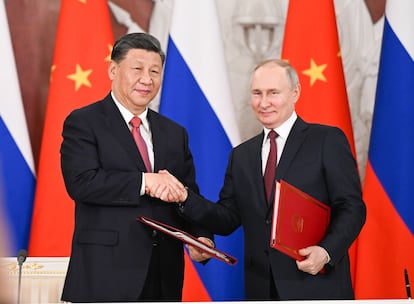The war in Ukraine and the hidden interests of the globe’s powers
A breakdown of the strategic calculations made by the chief players surrounding the conflict

It has been an intense week for Ukraine. Both in the diplomatic arena, where the presidents of China and Brazil have had their say; and on the battlefield, where Vladimir Putin’s missiles are raining down on Ukrainian cities. Amid talk about brokering peace, war continues to be waged, and behind it all there is a vast web of intentions that may not be expressed out loud but are clearly there. What follows is an attempt to untangle them.
The president of China, Xi Jinping, has finally called his Ukrainian counterpart, Volodymyr Zelenskiy. The Chinese regime is out to portray itself to the world, and particularly to the global south, as a driving force for peace. China’s official stance is laid out in a 12-point document published to coincide with the anniversary of the invasion. It amounts to no more than a statement of principles that does absolutely nothing to bring about peace talks. China’s actual stance says a lot more than that document. It tells us that this is a power that doesn’t supply weapons to Russia as things stand but doesn’t use its influence over the country to put the brakes on its aggression, either. On the contrary: it is offering Russia economic breathing space, and in several ways is deepening military ties with the Russians – including a visit by its defense minister to Moscow – and boosting diplomatic links between the two nations. In short, China isn’t a neutral party; it is clearly aligned with Russia. What is its strategic calculation? Probably that it doesn’t want any outcome that is damaging to Putin; or that is positive for the Western world, enabling Ukraine’s integration into its democratic and geopolitical sphere. That would represent a major success for the West. It’s in China’s interests for the United States to be busy with Europe; it would love to drive a wedge between the European Union and the U.S., amid Belgian weariness; and it has no problem receiving cheap oil and gas from Russia.
The Brazilian president, Luiz Inácio Lula da Silva, has also taken center stage this week with his attempts to promote peace. His actions, of course, should be treated completely differently to the movements of the Chinese regime. Peace is light years away, but seeking it out is, in the abstract, worthy of praise. And if a democrat is behind such an attempt, so much the better. Naturally, the problem is how he goes about it. Lula’s rhetoric is hard for many in democratic countries to swallow. Alongside his talk of peace, he has also made comments to the effect that, in his view, sending weapons to Ukraine is merely prolonging the fighting; and that Zelenskiy is just as responsible for the war as Putin. That it takes two to tango. What Lula hasn’t said is also significant. In an interview with this newspaper, he offered an impassioned defense of democracy against the threat of the far right, but shied away from even the slightest, most veiled criticism of the oppressive Chinese regime. When asked about this subject, he was evasive. What is his strategic calculation? It’s reasonable to conclude that this silence – and everything that has come out of his visit to Beijing – is more indicative of a major interest in consolidating Brazil’s relationship with China, than of an attitude of caution motivated by issues relating to the war in Ukraine.
Meanwhile, Lula’s desire to be at the forefront of an initiative for peace probably comes down to his ambitions for advancing Brazil’s position on the world stage, by consolidating its role as a middle power, by banking credit that can lead to growth in the country’s influence in international institutions, and by establishing the nation as a leader in the global south. Those are all legitimate aims; none of that discredits his actions. It’s simply something that’s worth bearing in mind.
The U.S., clearly, has also run calculations that it’s keeping to itself. One imagines that it is in the States’ interests for an adversary such as Russia to be in a grueling conflict in which Washington isn’t sustaining casualties. A crisis atmosphere that unites the U.S. with its global allies also works in its favor, and it isn’t unhappy about the injection of revenue from gas exports to Europe. These are all very credible assumptions to make. That, however, isn’t the same as saying flat out that this war is in its interests. At the very least, the U.S. would rather it didn’t have to focus on European tragedies when its primary concern is really China.
The global south, of course, also has its own undeclared aims in this scenario. An assorted collection of countries who undeniably deserve greater status within the world order, they’re only too familiar with the excesses of the powers of the global north. That, though, hasn’t stopped many of them from developing strategies, perhaps with a touch of hypocrisy, in the face of an invasion that is nothing other than a colonial war, and in the face of the heavyweight rivalry between the U.S. and China. In both dynamics, the superpowers are looking for allies – and in the global south, countries are busy calculating how best to gain an advantage by getting close to one power, getting close to another, making themselves desirable. Within the loose concept of the global south, special mention should go to India, which is boosting its profile, cozying up to the West against China, and buying cheap oil from Russia. A country with a significant size advantage over Brazil, and with democratic values that are in clear decline, India is attempting to establish itself at the head of this diverse group.
That leaves the E.U. What is its hidden agenda? It’s difficult to say. Not because we in the bloc are morally a cut above the rest, but because we have 27 different points of view that must negotiate the arduous process of being brought into harmony. The E.U. has offered a unified and effective reaction to Russia’s aggression. We’re still working on how to interact with China and, overall, how to position ourselves on the global chess board. We’ve taken steps forward, but we’re still some way from having a genuine, shared strategic vision. So, it’s hard to truly pin down what our covert interests are.
People are right when they say that it’s unwise to seek a world split cleanly between a bloc of democracies and another of autocracies. Cooperation on a host of issues is possible and is necessary, and a short-sighted ideological confrontation would serve to scupper a valuable arena of pragmatic collaboration that has no reason to disappear. Even on matters such as the Ukraine war, there can and must be solution-seeking dialogue with those, including authoritarian regimes, who recognize basic tenets of international law such as the sovereignty and territorial integrity of states.
But it’s precisely that structure, international law, that pushes us to be extremely prudent and skeptical when faced with Russia, which has flagrantly violated it, and China, which is not only a repressive regime at home, but also asserts itself to worrying degrees in disputed waters. Both advocate a change to the international order that entails a frightening reduction of human rights. That cannot be overlooked. Of course, the U.S. and other Western countries have amassed serious abuses of international law in the past. The errors of the past deserve absolute opprobrium, but do not justify a kind of compensatory tolerance for new abuses. That’s why, without even getting into the domestic darkness of Putin’s autocratic regime, it seems very difficult to sit down and negotiate a peace settlement while the Kremlin militarily occupies a still very large section of Ukraine, and while those who have been invaded remain determined to fight to eject their aggressors. Scooping a prize of such significance through brute force would be a hugely dangerous precedent to set for the entire world. For that reason, it’s perhaps too soon. That, maybe, is at the heart of the disconnect between Lula’s highly overt initiative and the more discreet approach taken by others.
Sign up for our weekly newsletter to get more English-language news coverage from EL PAÍS USA Edition
Tu suscripción se está usando en otro dispositivo
¿Quieres añadir otro usuario a tu suscripción?
Si continúas leyendo en este dispositivo, no se podrá leer en el otro.
FlechaTu suscripción se está usando en otro dispositivo y solo puedes acceder a EL PAÍS desde un dispositivo a la vez.
Si quieres compartir tu cuenta, cambia tu suscripción a la modalidad Premium, así podrás añadir otro usuario. Cada uno accederá con su propia cuenta de email, lo que os permitirá personalizar vuestra experiencia en EL PAÍS.
¿Tienes una suscripción de empresa? Accede aquí para contratar más cuentas.
En el caso de no saber quién está usando tu cuenta, te recomendamos cambiar tu contraseña aquí.
Si decides continuar compartiendo tu cuenta, este mensaje se mostrará en tu dispositivo y en el de la otra persona que está usando tu cuenta de forma indefinida, afectando a tu experiencia de lectura. Puedes consultar aquí los términos y condiciones de la suscripción digital.









































